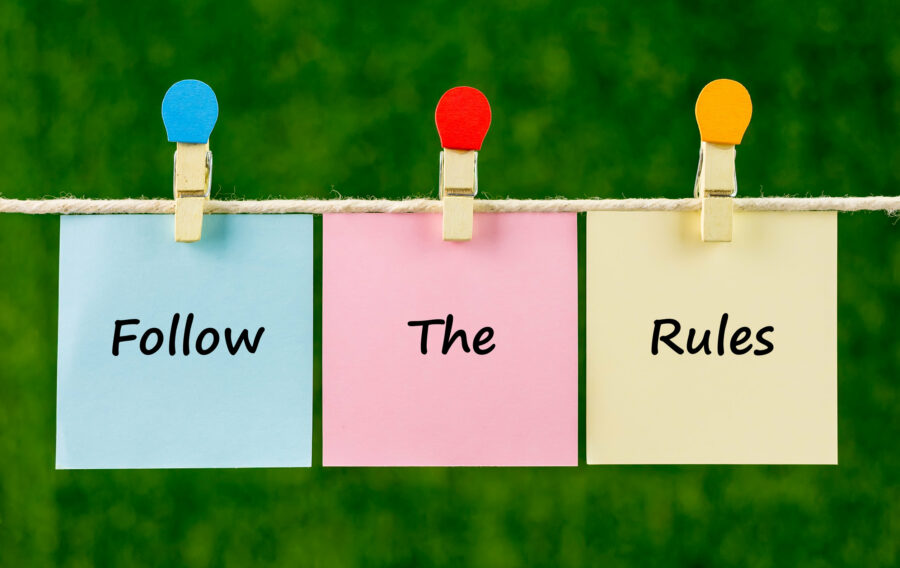Rules!

If you are a RO therapist or client, you will know that the therapy introduces 5 Behavioural Themes in individual sessions. The 5 themes are:
- Inhibited Emotional Expression
- Overly Cautious and Hyper-Vigilant
- Rigid and Rule Governed Behaviour
- Aloof and Distant Relationships
- Envy and Bitterness
The purpose of introducing these themes is to gather social signalling targets for the diary card that might be keeping folks from meeting their valued goals. And since most therapists lean to OC themselves, it might be fun to look at how the themes apply in their own life! One of my first professors taught me a simple but profound lesson: never ask your clients to do something you haven’t done or be willing to (love to you Greg Saunders!). This is also a principle we teach RO DBT therapists – that RO DBT is not merely an intellectual pursuit but an embodied one. Knowing how the themes pop up in your life can help you master the language of social signalling and also increase empathy for how these social signals have been habituated and reinforced over time for OC folks.
I have been doing a deep dive into Rigid and Rule Governed Behaviour. It is one of my continuous areas of growth (a.k.a. a royal pain in the butt! Haven’t I already done this? Why is this not perfectly resolved?) On the one hand, I joke with my clients that if everyone followed the rules in my head, the world would be a much more efficient and less irritating place. On the other hand, I share with them that since these numerous rules are often not met, the only person left suffering is me! So, does it make sense to pour my energy into rectifying others’ apparent anarchy or to yield some of my rules? The obvious answer, of course, is also the hardest.
What are some of my rules and subsequent rigid behaviours?
- Work before play
- Always be on time
- Figure things out yourself
- No dirty dishes in the sink
- Answer all email before bedtime
- Once a plan is made, it should stay that way
- Everyone should work as hard as I do
- Board games are night time activities unless on vacation
Ok, the list might be a little longer (tee-hee) and I tell ya, not always awesome for my own mental health or relationships. Because it is not just the rules that narrow life, but how indirectly they are communicated. It’s not like I have a pre-printed list that I give to potential friends and colleagues so they can meet my expectations! So, when my rules are not followed, there is a social signal that accompanies them. Take the board game rule. My mother-in-law came for a brunch and the preparation time was taking longer than usual, so she suggested we break out the backgammon board. I might have sneered a bit before saying sarcastically “well that would be rather indulgent!” I mean, I don’t think backgammon before breakfast has ever killed anyone before but my response suggested it could. Did it match my valued goal of having an easy-going relationship with my mother-in-law? No. Did she understand this was a rule and not an insult? No. By rigidly enforcing my arbitrary rule, I spoiled the fun (again). I can also spoil the fun without saying a word! A heavy sigh when someone says they are running late, doing the dishes noisily so my partner can hear what she “should” have done, rolling my eyes when a colleague declines a project, and so forth. These non verbal, and often subtle, social signals poison interactions. I’m not proud of them, by the way, so that’s why I have been working on them.
Now – all hope is not lost (phew!), as a fundamental piece of RO DBT is flexible responding. COVID has been a strange experiment in this. Globally, we have all been subject to mandates and health orders. In some ways I found this enormously helpful as it gave structure to something that felt so chaotic and frightening. I sometimes say when the going gets uncertain, the overcontrolled get rigid! In terms of the pandemic, good rule following was a must; many of my clients joked that “my temperament prepared me for a pandemic!” and they were model citizens staying out of public and following the rules. At the same time, I had to relinquish some of my own rules (e.g. life should be fair or go my way) in response, and that was painful. And the ultimate test is the evolving rules as the virus evolves as well. More flexible responding is likely going to be helpful for me as I weather more disappointments around cancelled travel, not being able to connect in person with my global tribe of friends, or replenishing my mask supplies yet again. Apparently, my rule of “plans should never change” is being challenged!
So, I invite you to reflect on your own rigid and rule governed behaviours and what social signals come with them. Are these social signals aligned with your valued-goals? What would you put on your own diary card? And if you are so inclined, the next meeting of Rigid and Rule Governed OC Meeting of the Minds is happening in September. Likely the first 10 meetings will be setting the rules of engagement. (Just teasing – 😉 )
Post script – my partner just came in the office and asked what I was writing. I told her it was a blog about rigid and rule governed behaviour. She said, “good thing they have an expert in rules writing that” followed by a big wink and her beautiful smile. I think she’s onto me!